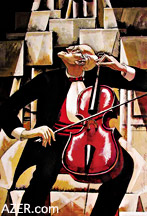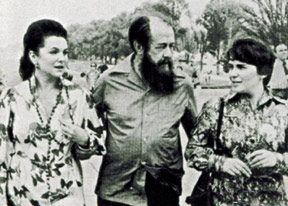|

Summer 2005 (13.2)
Pages
28-29
Intellectual Responsibility
When Silence is Not Golden
Conversations
with Mstislav Rostropovich (1927-2007)
and Galina Vishnevskaya by Claude Samuel
Other articles about
Rostropovich
(1) "Rostropovich:
The Home Museum" by Gulnar Aydamirova. (AI 11.2, Summer
2003)
(2) "Rostropovich:
Happy 75th Birthday. World-Famous Cellist Celebrates in Baku."
(AI 10.1, Spring 2002)
(3) "Rostropovich & Galina: Celebrating Their 50th
Wedding Anniversary" by Betty Blair and Sheyla Heydarova.
(AI 13.2, Summer 2005)
(4) "Famous
People: Then and Now. Mstislav Rostropovich - Cellist and
Conductor (1927-2007)." (AI 7.4, Winter1999)
(5) "Rostropovich
Celebrates 70th Jubilee in Baku." (AI 5.2, Summer 1997)
(6) "Philharmonic Reopens: Renovation
of Baku's Prestigious Concert Hall," by Abid Sharifov,
Deputy Prime Minister. (AI 12.2, Summer 2004).
Editor: What is
the responsibility of intellectuals to other artists and thinkers
whom they know are being repressed by their respective governments
in other parts of the world? What can they do? What should they
do? And does it matter?
The following is an excerpt from conversations wtih music critic
Claude Samuel and world-famous cellist Mstislav Rostropovich
and his wife, Bolshoi Opera singer Galina Vishnevskaya. Rostropovich
was born in Baku. The home in which he was born was recently
converted into a home museum and the street named after father
and son cellists - Leopold and Mstislav.
The observations about how intellectuals should be active grew
out of their own personal experience in assisting Russian composers
Prokofiev and Shostakovich whose works were censured for a period
of time under the restrictive Soviet regime. But then the spotlight
was turned on Rostropovich and Galina themselves in 1970 when
they befriended dissident writer Alexander Solshenitsyn (author
of "One Day in the Life of Ivan Denisovich" and later
the three volume "Gulag Archipelago" describing the
horrors of the prison camps in Siberia, which he himself had
survived and had lived to tell the story).
  Left: Mstislav Rostropovich, World renown
cellist, painted by Tahir Salahov. On display in Baku at the
Rostropovich Home Museum in Baku, where the musician was born. Left: Mstislav Rostropovich, World renown
cellist, painted by Tahir Salahov. On display in Baku at the
Rostropovich Home Museum in Baku, where the musician was born.
Rostropovich invited the writer and his family to spend the winter
at his dacha outside of Moscow, as he had no place to live. Then
the musician wrote an Open Letter in support of the maligned
writer. But his humanitarian gesture brought on retaliation.
Soviet authorities turned the spotlight on the musicians and
revoked their citizenship and stripped them of all the music
honors and privileges while they were on a two-year tour in the
United States. This meant the Lenin and Stalin medals, which
were the ultimate awards bestowed in the Soviet Union by some
of the most respected and highly qualified musicians and music
critics in the world. It's an understatement to say that Rostropovich
and Galina were shocked by the decision.
Here, Galina and Rostropovich with French journalist and renowned
music critic Claude Samuel discuss the responsibility of artists
and intellectuals when they learn that fellow artists are being
repressed by their governments. Although the conversation took
place in 1983, it is as relevant today as it was back then. The
silence and passiveness that Rostropovich speaks of during the
Soviet period, is no less pervasive and tangible today, and not
just in the republics of the former Soviet Union. Their words
offer a challenge to Western artists and intellectuals.
The following excerpt is from the book: "Mstislav Rostropovich
and Galina Vishnevskaya - Russia, Music and Liberty.
Conversations with Claude Samuel." Pages 122-126. See book
cover, opposite page.
Samuel: What
is the responsibility of intellectuals to their fellow artists
in other parts of the world who are being repressed?
Galina: An artist living in a totalitarian country can do nothing
or - as you well know - he will be immediately arrested. Sakharov
went on a hunger strike, but do we have the right to demand such
heroism of everyone? On the other hand, an artist who lives in
the free world cannot compromise. He has all the power and, therefore,
the obligation to speak, to express his opinions, and to protest.
Below:
Russian
dissident writer Alexander Solzhenitsyn with his wife and Galina
(left) in Washington DC, 1995. It was because Rostropovich befriended
the writer that he and Galina were stripped of their own citizenship
and superlative music awards.
  Rostropovich:
I have another question to pose. Sakharov went on a hunger strike
because Lise, his future daughter-in-law, couldn't join her fiancé
who had already defected to the West. Now, nobody in the Soviet
Union needed Lise. One more or one less Lise among 260 million
inhabitants: of what importance could it be? Everybody can understand
that - above all, Sakharov's two hundred academic colleagues,
who were cultivated men and great scholars. Rostropovich:
I have another question to pose. Sakharov went on a hunger strike
because Lise, his future daughter-in-law, couldn't join her fiancé
who had already defected to the West. Now, nobody in the Soviet
Union needed Lise. One more or one less Lise among 260 million
inhabitants: of what importance could it be? Everybody can understand
that - above all, Sakharov's two hundred academic colleagues,
who were cultivated men and great scholars.
But I would like to know who among them stood up to defend Sakharov,
their colleague, who was on the brink of the abyss. Not that
they would have spared their gold to erect a monument to his
glory. But they never had occasion to spend it. No one stood
up, though everyone knew that Sakharov was right. In the Soviet
Union, everyone understands that.
Galina: When I was living in the Soviet Union, I already thought,
and I think more than ever today, that the academicians and scholars
should have assembled and marched down the street together shouting,
"Enough of this tyranny!" They wouldn't have been shot!
Samuel: Why didn't they do it?
Galina: Because they were afraid! They're afraid in different
ways. One is afraid he won't be able to get permission for his
next trip abroad, another is afraid he won't get his raise...
Rostropovich: ...and someone else has a son finishing his secondary
schooling who would like to enter the university...
  Left: Available for purchase on the Internet:
"Mstislav Rostropovich and Galina Vishnevskaya-Russia, Music
and Liberty. Conversations with Claude Samuel." Reinhard
G. Pauly, General Editor. Amadeus Press: Portland, Oregon 1995,
223 pages. ISBN 0-931340-76-4. Translated from French by E. Thomas
Glasow. Copyright 1983 as "Entretiens avec Mstislav Rostropovitch
et Galina Viechnevskaia" by Editions Robert Laffont, Paris.
AI: Highly recommended. Lively and Insightful. Left: Available for purchase on the Internet:
"Mstislav Rostropovich and Galina Vishnevskaya-Russia, Music
and Liberty. Conversations with Claude Samuel." Reinhard
G. Pauly, General Editor. Amadeus Press: Portland, Oregon 1995,
223 pages. ISBN 0-931340-76-4. Translated from French by E. Thomas
Glasow. Copyright 1983 as "Entretiens avec Mstislav Rostropovitch
et Galina Viechnevskaia" by Editions Robert Laffont, Paris.
AI: Highly recommended. Lively and Insightful.
Galina: Yes, what do they fear? Petty things! Under the system,
people have become so small-minded that all ethical behavior
has been eradicated. Their only concern is getting a better loaf
of bread than their neighbor's, gaining access to a store that
is closed to other people, and buying a piece of sausage there
while the neighbor has to wait five hours in line for the same
amount of sausage! That's how they live, and that's why they
haven't denounced the injustice.
Samuel: What a great victory for the Soviet regime: the intellectuals
are reduced to silence!
Rostropovich: It must be said that it was accomplished at the
cost of tens of millions of human lives!
Galina: Millions of people who were physically exterminated,
and others whose spiritual existence was stifled.
Samuel: As for the silence of the composers...
Rostropovich: The composers? Do you think my great friend Shostakovich
who wrote some works especially for me, my close friend Khachaturian,
or a composer like Kabalevsky didn't know what I was going through
when I was being persecuted? They knew! Shostakovich and Khachaturian
saw me weeping several times. Couldn't they all have gone together
to see the members of the government, to tell them, "You
know, Rostropovich is an artist who can still serve Soviet music;
he can be of great musical use to us, so don't dismiss him! He
has numerous students, and you're apt to weaken our cello program
- "?
None of them tried that approach because if they had stepped
forward, Brezhnev would have raised his eyebrow and, with one
eye shut, would have murmured, "Yes, he might not be a bad
musician, but he isn't on our side! How could you think of pleading
his case? How could you make such a mistake?"
Galina: And, the following year, as a result of their behavior
in the matter, one of them might not receive the Lenin Prize!
Rostropovich: However strongly Galina and I describe the situation
to you, we really feel it's difficult to explain it all to you
in words. But when you live over there, when it's your skin on
the line, it's a different matter!
Galina: Future generations will be appalled by the Soviet regime's
misdeeds, but won't they be even more appalled at the silence
of the free world? Here, anything is possible. Mouths, ears,
and eyes are open, but the people don't want to understand what's
happening over there. They don't want to. And that's an international
refusal. You can scream all you want, they plug their ears. When
you tell them, "Look, I'm bleeding, I'm being skinned alive!"
they answer, "No, it isn't true!"
Samuel: What can someone who is a Soviet dissident do in the
West?
Rostropovich: My duty is to explain what I know, honestly, everywhere,
to tell what I myself have endured.
Galina: And if we don't use this opportunity, it's a crime against
all those who remain over there.
Rostropovich: If we had come to the West as Soviet artists on
tour, we wouldn't have been able to say half of one word of what
we are saying today. Because we would have left our children
over there, and we know very well that half a word would have
been enough: from the moment we returned to Russia, our lives
would have been over. I understand all the Soviet artists who
remain silent. If I were still a Soviet artist, I would be silent
too. We all kept quiet.
Samuel: Today [1983], on the contrary, one of your ambitions
is to put pressure on Western governments.
Galina: We tell the stories, we speak of everything that we endured,
everything we know, and the people themselves must draw their
own conclusions.
Rostropovich: We're not trying to tell anyone what to do, whether
they are our friends, or kings, or presidents.
Galina: But when people question us, we tell the truth.
Samuel: Don't you think that the silence of the West might be
justified by the necessity of peaceful world coexistence? Being
silent - to live in peace?
Galina: That was already done under Hitler, and that was enough!
That method had been tried. Now maybe we should try another approach:
force or disobedience!
Back to Index AI 13.2 (Summer
2005)
AI Home
| Search | Magazine
Choice
| Topics
| AI Store | Contact us
Other Web sites
created by Azerbaijan International
AZgallery.org | AZERI.org | HAJIBEYOV.com
|






